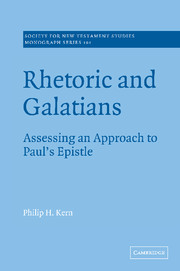Book contents
- Frontmatter
- Contents
- Preface
- List of abbreviations
- 1 Introduction
- 2 Towards a definition of rhetoric
- 3 Methods of rhetorical analysis and Galatians
- 4 Rhetorical structure and Galatians
- 5 Rhetorical species and Galatians
- 6 The language of Paul's letters: 1. As evaluated by early Christian writers
- 7 The language of Paul's letters: 2. The contribution of modern studies
- 8 Conclusions
- Select bibliography
- Index of subjects
- Index of modern authors
- Society for New Testament Studies
5 - Rhetorical species and Galatians
Published online by Cambridge University Press: 22 September 2009
- Frontmatter
- Contents
- Preface
- List of abbreviations
- 1 Introduction
- 2 Towards a definition of rhetoric
- 3 Methods of rhetorical analysis and Galatians
- 4 Rhetorical structure and Galatians
- 5 Rhetorical species and Galatians
- 6 The language of Paul's letters: 1. As evaluated by early Christian writers
- 7 The language of Paul's letters: 2. The contribution of modern studies
- 8 Conclusions
- Select bibliography
- Index of subjects
- Index of modern authors
- Society for New Testament Studies
Summary
The third chapter of Aristotle's Rhetoric introduces three ‘kinds of rhetoric … corresponding to the three kinds of hearers’ (1.3.1), a scheme which springs from the notion that the speaker, the issue and the hearer all exert a force upon the speech. Each of the three species (this division was accepted by subsequent handbooks) can be understood according to its effect on the hearer (its purpose) and its temporal distinctives. The first type, judicial (or forensic [δικανικόν, iudiciale]), represents the rhetoric of the law-courts addressed to a judge or jury (ὅ δικαστής; 1.3.2), the purpose of the ‘litigant’ (1.3.3) being to defend or accuse concerning a past action (1.3.4). Its stated end (τέλος) is the just or the unjust (Rhetoric 1.3.5).
Deliberative (συμβουλευτικόν, deliberativum) or parliamentary oratory aims to exhort or dissuade the assembly concerning some future action, persuading the audience to embark on an expedient course or to avoid a harmful one (the τέλος of deliberative: Rhetoric 1.3.5). This is later specified as ‘the discussion of policy’.
Epideictic (demonstrative, ⋯πιδεικτóν, demonstrativum, panegyric), the oratory of praise or blame (Rhetoric 1.3.3), focuses on the present (‘for it is the existing condition of things that all those who praise or blame have in view’ 1.3.4), though Aristotle adds ‘It is not uncommon … for the epideictic speakers to avail themselves of other times, of the past by way of recalling it, or the future by way of anticipating it’ (1.3.4).
- Type
- Chapter
- Information
- Rhetoric and GalatiansAssessing an Approach to Paul's Epistle, pp. 120 - 166Publisher: Cambridge University PressPrint publication year: 1998



